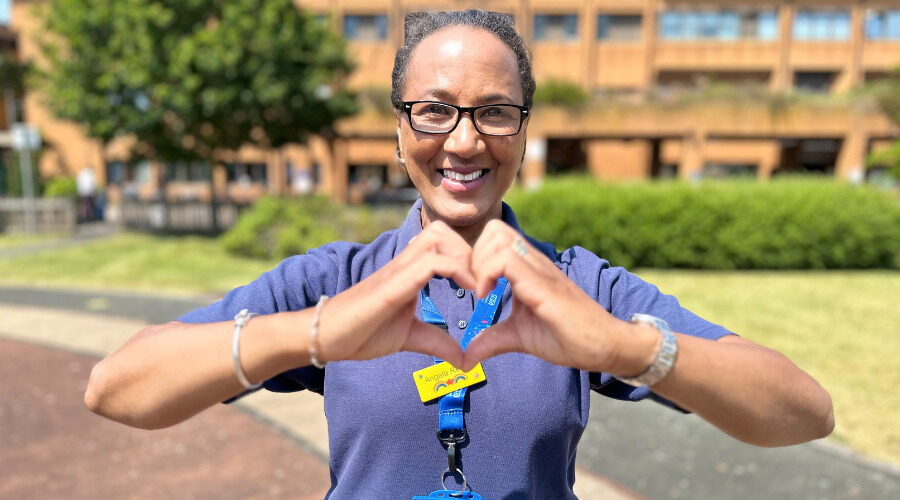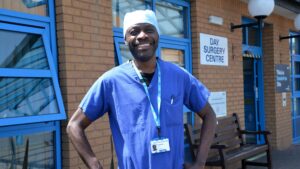
Spotlight
NHS colleagues Angela and Paul tell their Windrush stories
Every year, the nation celebrates Windrush Day on 22 June, marking the arrival of Afro-Caribbean people to the shores of Britain 74 years ago on the SS Empire Windrush ship.
An estimated half a million people made their way to England after the Second World War, invited to the UK to fill labour shortages, and support the post war efforts to restore Britain.
This Windrush Day, we have teamed up with our colleagues at the NHS Somerset integrated care board and Glastonbury Festival to recognise and celebrate the enormous contribution of this generation, and the contribution of many of our colleagues who are descendants, making up the NHS that we know today.
Two of our colleagues, Paul Ennis, a healthcare assistant in our Day Surgery Centre at Musgrove Park Hospital, and Angela Reece, a specialist nurse for children looked after who works in the community, will feature in a special film commemorating the NHS’s 75th birthday, that’ll be aired on the Pyramid Stage at Glastonbury this Saturday (24 June) at 5:30pm.

Paul’s granduncle came to the UK just after the war as part of the Windrush generation. Below he shares his story...
“My granduncle’s first experience of the UK was that it wasn’t like the world he was used to,” said Paul.
“He couldn't get a place to rent because black people weren't accepted in some places – in fact there were even signs in the windows saying 'no blacks allowed'.
“Most of the issues came from the London transport and where he worked – on the bus he had to go at the back to sit down.
“Treatment at his work wasn't much better – the verbal abuse was so bad that he started to wonder why he had even come to a place like this. He often had to listen to comments such as 'get back on the banana boat and go home'. He stuck it out for a number of years until he moved to America, where he remained until his death a few years ago.
“Windrush Day always reminds me of my dear granduncle and his story. Even if the generation has changed, there is still racism in current society.
“I believe that anti-racism and inclusion must be everyone’s business. When we work towards the same goal of equality and diversity, I am sure that we can make a better place for everyone.”
Angela’s parents were originally from Jamaica and also came to the UK as part of Windrush...
“My parents were born in Jamaica, and as it was part of the Commonwealth and British Empire, residents were invited to travel to the UK to contribute to society and help to rebuild the economy in post-war Britain,” said Angela. “Many Jamaicans felt it their duty, and made the decision to travel to an unfamiliar land.
“At 24 years old, my dad felt this was a great opportunity to make a new and different future for his family. The difficulty for him at this time was that he did not have the money to be able to travel. My mother also thought this was a great opportunity and she approached her parents to give/lend the money to allow my dad to travel.
“This was the time of great upheaval in the country and many young men and women travelled between 1958 and 1971.
“When my dad left Jamaica in 1960 as part of the Windrush Generation, my mum was already pregnant with their third child – it was four years until dad met his youngest child.
"It took dad over a month to travel by boat, via Italy, and then to Britain. The journey lacked any comforts or luxuries and was a basic one-month trip.
“Dad arrived and worked in lower paid jobs, always in manual labour, and very often shift work.
“It was not easy being a first-generation Jamaican in England, in the early 1960s. Racism, anger and aggression was a regular occurrence.
“Saving money and finding safety in numbers, dad lived cheaply with other Jamaicans in what we might now as label as “overpopulated bedsits in the more run-down areas of Bristol.
“True to his word to mum, dad sent money back to Jamaica to help with the raising of children and also saved money and sent for mum, and she arrived in the UK in 1962.
“Sadly, she had to leave her three children behind in Jamaica to be cared for by grandparents. It would be another four years until they could afford to pay for the children to arrive in the UK.
“The story of my parents’ journey mirrors the same as many migrants from Jamaica to the UK in the early 1960s, it is not unique. I see my parents as extremely hard-working people with such great strength of character loyalty and integrity. They went through so much to be able to provide better future which they planned in the 1950s. It was never easy for them.
“After adding to the UK society and economy, they retired and returned to Jamaica in 1993, and are currently still enjoying their lives. I’m so proud of them.”

